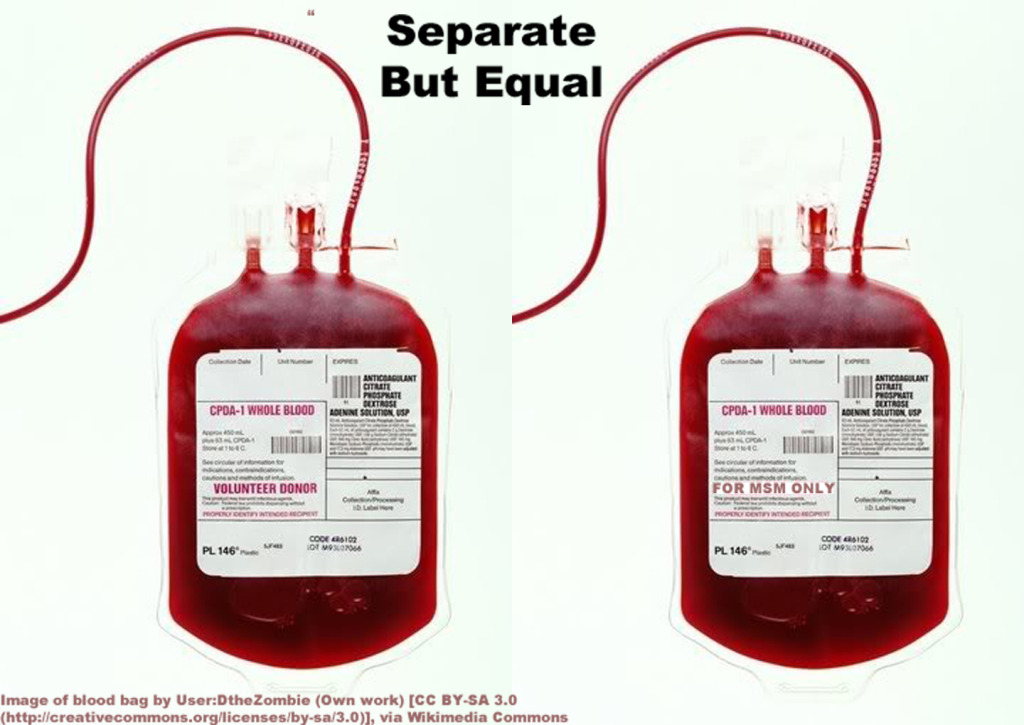by Craig Klugman, Ph.D.
Have you taken the “Celibacy Challenge?” This satirical national campaign is in response to a proposal from the FDA that would amend the lifetime blood donation ban of men who have sex with men (MSM) to only a one-year ban. The hitch is that the men would have to refrain from sex with men for one year. They could have sex with women during that year, just not men.
This proposed one-year celibacy ban is in line with the rules of other nations. Both the U.K. and Australia have one-year bans on male-male sexual contact before donation. I guess the proposal could be stricter—Canada has a five-year ban on donating after male-male sexual activity.
Since 1983, the United States has banned men who have had sex with men, even one time, from ever donating blood. The reasoning is that the risk of HIV in this population is higher than in the general population. Of course in 1983, the term AIDS was new and the HIV virus had just been identified. AIDS was still known as that “gay” disease and everyone was scared. In 2010, 63% of new HIV infections are to men who have sex with men (MSM). But not among all MSM. It is not spread among monogamous male-male couples. Nine percent of new infections are from IV drug users. This means that 28% of new infections are among heterosexuals.
Consider that a woman who has sex with a man who had sex with a man is also banned for donating for a year (though she can have sex with other men (who are not MSM) or women during that year). A bisexual man could have sex with women, just not men for a year. A man and woman can have unsafe sex and still donate. A man with several women can have sex or a woman with several men (as long as they don’t touch each other) and they can all donate blood. But two men in a committed monogamous relationship who have had sex with only each other for 20 years and who have tested negative for HIV cannot donate.
I say that the ban does not go far enough. If we truly want a safe blood supply, then justice says we need a one-year ban on donating for all sexual activities. If you have had sex in the past year, with anyone, then you cannot donate.
There will be some criticisms of this ban that it would essentially drop the number of potential blood donors to somewhere near zero. Actually, an ABCNews polls found that only 78% of adult Americans have had sex in the last year. That means 22% of people would still be eligible to donate in any given there.
The other alternative is to adopt a “separate but equal” approach. Let’s start a gay blood bank. This would be a parallel blood donation system, which would accept blood from MSM who have a low risk for HIV. This includes people in monogamous relationships, people who always practice safe sex, people who consent for HIV testing before donating their blood, and women who had safe sex with a MSM. Such a move is necessary because of the latent anti-homosexual bias in American blood policy.
Such a step is not unprecedented. In November 2013, public law 113-51 was signed by President Obama. This law allowed organ transplants between HIV positive donors and HIV positive recipients. So if the concept works for HIV patients (many of whom are not MSM) then why not try it for HIV negative gay men who are not permitted to be blood donors.
The issue is of MSM blood donation is important to bioethics because it is about civil rights, weighing those rights against a perceived danger to the public health, and about justice. Aristotle tells us to “treat likes alike.” The lesson being that one should not discriminate based on arbitrary criteria. Thus, we should not have sexism, racism, etc. Consider two couples, both married for ten years, and both monogamous. One is a male-male couple and the other male-female. The first couple is banned for donating and the second can donate. If the male-female couple should cheat on each other and have affairs, they can still donate. Is this just? Is this fair? Does this protect the blood supply?
There are three potential solutions to this unfairness.
- Ban anyone who has had sex in the last year from donating. This would not discriminate against MSM.
- Develop parallel blood donation systems: the current one for those who fear catching “gay” through the blood supply and one for monogamous and safe MSM donors (and the women who love them)
- Create a donation system that assesses real risk, not perceived moral panic risk.
The third choice is clearly the only one that is plausible or that makes scientific and logical sense. The FDA does not need the Celibacy Challenge or me to satirize them, they do it very well to themselves.

